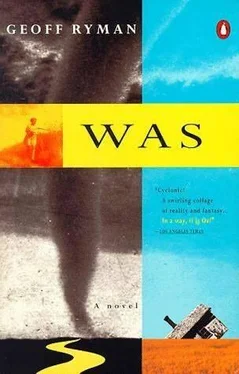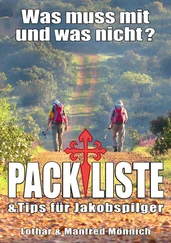FAREWELL, said a scroll over a carving of a man's and a woman's clasping hands:
ANNIE J. PILLSBURY
WIFE OF B. MARSHALL
DIED
FEB 26 1857
AGED
27 Ys, 7 Ms, 27 Ds
Down the row from that there was an obelisk:
MARY ANN
REED
PILLSBURY
BORN
JULY 21 1826
DIED
JAN I 1892
There were more humble stones, small, laid level with the ground. Bill leaned over to read them.
MOTHER
HELEN EVA
MAR 14 1869 FEB 12 1937
LIVED ON PILLSBURY HOMESTEAD 58 YRS
Side by side.
FATHER
ELLERY CHANNING
APR 5 1850 JAN 6 1933
KANSAS PIONEER OF 1862
Jonathan began to sing, amid the sound of crickets. His throat was raw, his voice cracked, harsh, tuneless:
My eyes have seen the glory of the coming of the Lord!
Bill looked up to see Jonathan staggering up the hill. His singing grew louder. He looked like something that had climbed out of the graves, long legs, skeletal arms flapping wildly.
He is pressing out the vintage where the grapes of wrath are stored!
Oblivious of the gravestones, Jonathan marched up the hill, out of the cemetery.
"Jonathan!" called Bill. "Where are you going?"
The voice went wild, loud, screeching like a hawk.
Glory, glory, hallelujah!
Jonathan was marching out toward the prairie, into the high, crackling grasses. There was a barbed-wire fence on top of the hill. Jonathan stumbled into it, entangled, holding out his arms. like a scarecrow.
Bill ran after him, puffing up the slope. Fifty years. The grass streaked with blue and purple slashed his ankles.
On the hill someone had lashed together a crucifix of branches, barkless and polished by the weather. Jonathan howled, arms waving as if blown in the wind:
His truth is marching on!
Like a rag wrung dry, the voice gave way. Panting, Bill stopped running and pushed his way up the hill, hands against his knees.
Jonathan was standing, staring, mouth hanging open. His teeth showed, and his gums, and his staring eyes watered. Bill turned and saw the valley, with its one straight road, its large fields, some of them harvested and plowed under, some left browning. There were woods in bands every mile or so, across the valley, to the hills, piebald in blue and gray.
"Come on, Jonathan," said Bill and took his arm and led him down the hill. Jonathan didn't say anything. Bill could feel the weakness in Jonathan's knees. He trembled, hot, like a trapped bird.
The time was twelve-thirty. Please, Lord, give him three more hours. Three more hours is all we ask.
Back among the dead, Jonathan seemed calmer, more focused. He blinked, and his eyes and head began to move, looking around him. Very suddenly, despite Bill, he knelt.
"Look," Jonathan said, very gently.
There was a low flat grave. He pulled grass away from its face.
HENRY
GULCH
1831-1888
HUSBAND OF EMMA ANGELINE
BRANSCOMB
"A name," whispered Jonathan. "Or a geographical feature." They headed back toward Zeandale. After they had turned out of the gate, Bill asked Jonathan, "Why were you doing all that singing back there?"
Jonathan looked around in mild surprise. "Was that me?" he asked.
They eased down into the valley, passing a road on the left. AIKEN'S LANE, said the sign in green.
"Turn there," said Jonathan.
Bill stopped the car with a very slight skid on the dirt, and backed up. Aiken's Lane hugged the side of the hill. It passed farmhouses. One of them had walls covered in roof tiles. Another was white frame, with awnings. Old houses no longer seemed to interest Jonathan much. He turned away from them toward the fields.
They drove over a ditch. The bridge was made of wooden beams. Reeds and flowering plants grew along the banks. The ditch's bed was smooth, damp, cracked. It ran off into the silent fields and was lost among them.
They came to a house where one wooded slope dipped down and another rose up, a gentle cleft in the hillside. The house had a blank stone front with some kind of ivy growing up the side and along the eaves. The roof had new, smooth tiles and small skylights and a TV antenna.
In the front garden, a woman in a blue tracksuit was pushing a hand plow through a vegetable patch.
"Stop," said Jonathan.
He got out of the car and drifted toward her. The light was so fierce, he was so thin, he seemed translucent. The woman looked up as he wavered toward her.
"I'm sorry to trouble you," said Jonathan in his faraway voice, the one that made him sound like a child.
"You bet," said the woman. She meant it was no trouble.
"I'm trying to find Sunflower School," he said.
"Well," she said, wiping her hands. She was rather old, rather plump for hand plows. Her blue-white hair was tied up in a scarf. She wore running shoes.
"Why sure. You can see it from here." She pointed toward the gunmetal-blue house, across the valley.
"Was there another Sunflower School before that?" Jonathan asked.
"I wouldn't know. But my husband might, and he'll be in for lunch soon."
"I'm very, very thirsty," said Jonathan.
"You're dead on your feet as well. My name's Marge Baker. Who are you?"
"I'm Jonathan. This is my counselor, Bill."
Bill stepped forward. "I would be very grateful if you could give Jonathan a drink," he said. "He's not well."
"I can see that, too," said Mrs. Baker. "Come on in and I'll give you some lemonade." She began to walk toward the house. The front porch had white metal railings around it and wind chimes that tinkled. A Dalmatian stood up in his cardboard box and barked and barked.
"Oh now, Rex! He's not used to visitors."
"Tell me," said Bill. "Did this farm used to belong to people called the Gulches, or the Branscombs?"
"I'm not from around here myself. I just came here to teach school and ended up marrying a farmer. Come on in."
They went through a side door into an extension, a kitchen, with wooden wainscoting and wooden floors, a rainbow rug, made of thick, braided, concentric circles of color, reds and greens and yellows. By the door, there was an old cabinet. It was thick and lumpy with generations of white paint. Inside it was a host of tiny oil lamps.
"Oh I collect those," said Mrs. Baker. She opened up the cabinet for them. She took out one with a blue glass base. NUTMEG, it said in embossed letters.
"Back then people used to buy spice in them. Now mind, these wouldn't be parlor lights. They would be little nightlights for children."
Very carefully, she put it back. "I said I would get you some lemonade, didn't I?"
"I'm sure it's delicious," said Jonathan. "But I think it might burn my stomach. Could I just have a glass of water?"
"Nothing simpler," she said. She poured a tumblerful from a new mixer tap.
"I'd like to look at your shed," said Jonathan.
He wants to get outside, thought Bill, in case he's sick.
"It is quite a feature," said Mrs. Baker.
Bill had not noticed the shed. It had been half hidden beside a newer outbuilding made of corrugated iron.
It was a log cabin.
As they approached, a cloud of crickets jumped up from the grass. The cloud swirled, thickened, thinned again, with cries like windup birds. Bill was pelted by them. They flew into him, their wings throbbing against his chest.
"Hello, Mary Ann," Jonathan whispered to them. "Hello, Ellery."
Mrs. Baker affected not to notice. "This is our storm cellar," she said. There was a doorway into the ground. It was made of wood, framed with limestone, and along the frame was a line of old stoneware jugs. Jonathan was running his fingers through the leaves of a tree. "What kind of tree is this?" he asked.
"That's a hackberry bush," said Mrs. Baker. "You can't do anything with the fruit, but the birds love them."
Читать дальше












